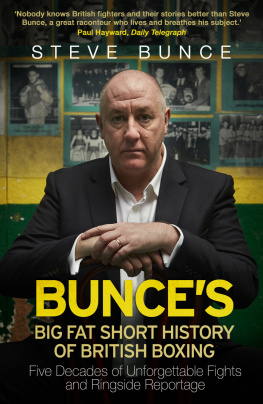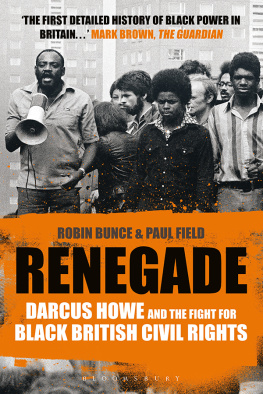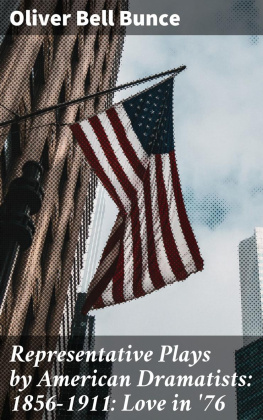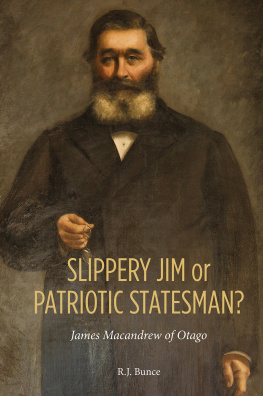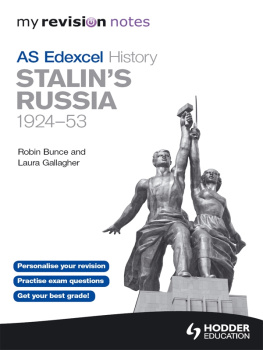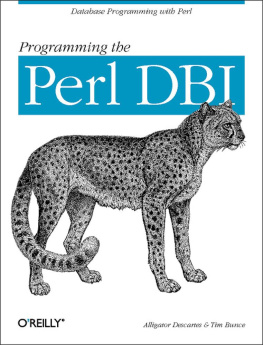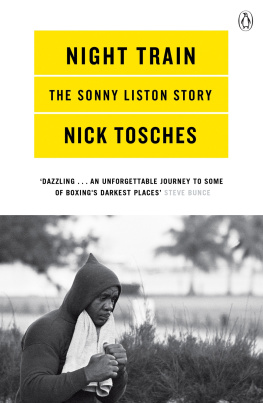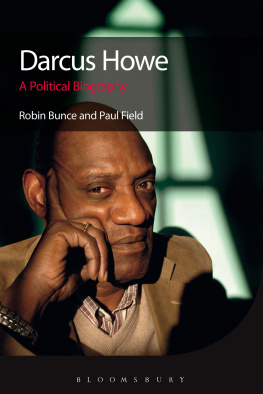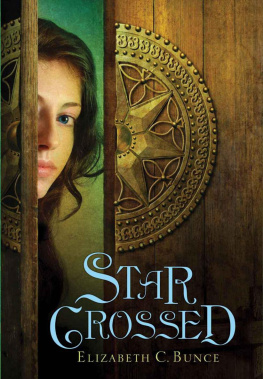Steve Bunce - Bunce’s: Big Fat Short History of British Boxing
Here you can read online Steve Bunce - Bunce’s: Big Fat Short History of British Boxing full text of the book (entire story) in english for free. Download pdf and epub, get meaning, cover and reviews about this ebook. year: 2017, publisher: Penguin Random House UK, genre: Non-fiction. Description of the work, (preface) as well as reviews are available. Best literature library LitArk.com created for fans of good reading and offers a wide selection of genres:
Romance novel
Science fiction
Adventure
Detective
Science
History
Home and family
Prose
Art
Politics
Computer
Non-fiction
Religion
Business
Children
Humor
Choose a favorite category and find really read worthwhile books. Enjoy immersion in the world of imagination, feel the emotions of the characters or learn something new for yourself, make an fascinating discovery.
- Book:Bunce’s: Big Fat Short History of British Boxing
- Author:
- Publisher:Penguin Random House UK
- Genre:
- Year:2017
- Rating:3 / 5
- Favourites:Add to favourites
- Your mark:
- 60
- 1
- 2
- 3
- 4
- 5
Bunce’s: Big Fat Short History of British Boxing: summary, description and annotation
We offer to read an annotation, description, summary or preface (depends on what the author of the book "Bunce’s: Big Fat Short History of British Boxing" wrote himself). If you haven't found the necessary information about the book — write in the comments, we will try to find it.
Bunce’s: Big Fat Short History of British Boxing — read online for free the complete book (whole text) full work
Below is the text of the book, divided by pages. System saving the place of the last page read, allows you to conveniently read the book "Bunce’s: Big Fat Short History of British Boxing" online for free, without having to search again every time where you left off. Put a bookmark, and you can go to the page where you finished reading at any time.
Font size:
Interval:
Bookmark:
THE FIXER
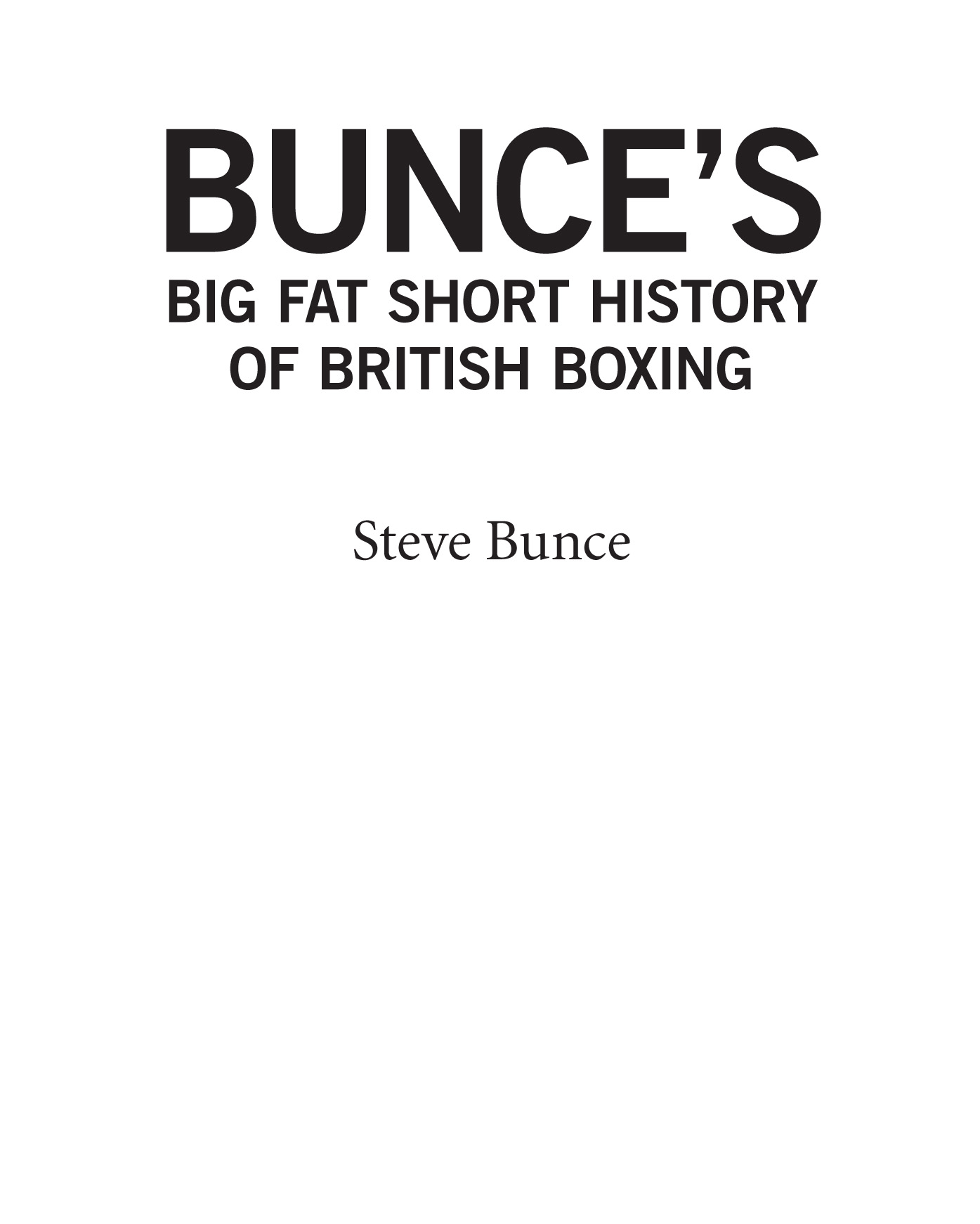
TRANSWORLD PUBLISHERS
6163 Uxbridge Road, London W5 5SA
www.penguin.co.uk
Transworld is part of the Penguin Random House group of companies whose addresses can be found at global.penguinrandomhouse.com

First published in Great Britain in 2017 by Bantam Press
an imprint of Transworld Publishers
Copyright Steve Bunce 2017
Cover design by Stephen Mulcahey/TW
Photograph of Steven Bunce Johnny Ring
Steve Bunce has asserted his right under the Copyright, Designs and Patents Act 1988 to be identified as the author of this work.
Every effort has been made to obtain the necessary permissions with reference to copyright material, both illustrative and quoted. We apologize for any omissions in this respect and will be pleased to make the appropriate acknowledgements in any future edition.
A CIP catalogue record for this book is available from the British Library.
Version 1.0 Epub ISBN 9781473543218
ISBN 9780593078709 (cased)
9780593079096 (tpb)
This ebook is copyright material and must not be copied, reproduced, transferred, distributed, leased, licensed or publicly performed or used in any way except as specifically permitted in writing by the publishers, as allowed under the terms and conditions under which it was purchased or as strictly permitted by applicable copyright law. Any unauthorized distribution or use of this text may be a direct infringement of the authors and publishers rights and those responsible may be liable in law accordingly.
1 3 5 7 9 10 8 6 4 2
For Jacqueline, my wife.
Dad.
And men we lost along the way:
Mick Carney, Billy Webster, Dean Powell, Reg Gutteridge, Wally Bartleman, Keith Bunker, Bradley Stone, Jimmy Murphy, Micky May, Glyn Leach and Roy Francis.
THIS IS THE first history of modern British boxing since the bare-knuckle heyday of the nineteenth century. It starts at a time when several South American countries were bigger forces in professional boxing and the entire Eastern Bloc was more formidable at amateur boxing than the British. In 1970, make no mistake, it looked like the British were simply not very good at the sport they invented. Not one British boxer held a world title at the start of January that year. Whats more, the men in charge of the British boxing business had no idea where their next world champion would come from and often acted like they never cared.
It has all changed. Less than fifty years later, at the very end of 2016, the men in charge of the British boxing business had thirteen world champions to keep busy, boxing in Britain had its own television channel, and fighters could sell 90,000 tickets in just a few hours. British boxers have also won five gold medals at the last three Olympics; in the previous twelve Games British boxers had won just two. This is not a renaissance, its a revolution.
The fighters, managers, trainers, promoters, fixers, losers, jokers and officials are gathered here, mostly for the first time ever in a book, to have their story told. Every major fight and boxer from 1 January 1970 to 31 December 2016 is here. There is a Bunny Johnson for every Frank Bruno, a Rocky Kelly for every Ricky Hatton, and a Gary Jackymelon for every Ken Buchanan.
It starts with the grizzled veterans of the smoke-filled arenas in the seventies and ends with the glittering new breed of modern boxers. They all fought for the same reasons, thrilled the same fans and left the venues with black eyes, glory, and some with great wealth from pay-per-view revenue. There are others that slipped away under the cover of night, their hats pulled down over their battered faces and their pockets empty. They are all here, crucial to the history with their wins, losses, lunacy, tragedy and triumphs.
There are nights and fights when over 20 million people watched on terrestrial television as men became heroes and household names for ever. There are also trips to foreign fights where terrible judges, hostile crowds and crooked operators ruined British boxers. There are nights that ended at dawn with champagne bottles all over the table and other nights that ended at dawn in lonely vigils under the dim lighting of an intensive care unit.
Not every fighter can be rich, unbeaten and hold a world title, and not every promoter can put on sell-out shows in massive indoor and outdoor arenas. Some of the boxers failed on both sides of the ropes, some walked away without a full explanation, and many have simply vanished. I have collected the names of the lost, neglected and overlooked too, and include hundreds of them here where they belong. And they belong next to British greats like Lloyd Honeyghan, Naseem Hamed, John Conteh, Lennox Lewis and Joe Calzaghe. I realized very early that most of these fighters, even some from only fifteen and twenty years ago, have never appeared in any books, never had their story told and had simply faded away. There are others that shone brightly for such a brief time that a constant reminder of their brilliance never grows old.
The men and women that guided and inspired the fighting men also play their part. The old-fashioned boxing press, too, has an important role that is often ignored in the modern business where the lines have been blurred by online correspondents; the impressive written words of the travelling scribes in the seventies and eighties are often the only remaining history from lost fights. I have gathered together all the proper voices, all the right sources, and used hundreds of my own notepads. I settled an argument on the spelling of a boxers name from the early seventies by looking in my old autograph book: it was there, and there was no final e.
The dead boxers and fight-game characters speak here, often as they move from amateur to professional to retirement; they get their history alongside the winners and losers they knew, fought, promoted, trained and matched. There are great fighters in these pages that are remembered for the first time, others that seem never to have been out of the news, and yet others that have been saved from general obscurity. They all form a unique story a big fat short history of British boxing.
Our Enery has been their best earner for years and this is no way to treat Britains greatest boxing hero.
Jim Wicks attacks the British Boxing Board of Control
Can we share this room? My guys not been given one.
Angelo Dundee asks Ken Buchanan if there is room for Muhammad Ali in the dressing room
HENRY COOPER WAS unemployed at the start of the year, his career at a standstill. He looked like one of those south London villains that are forever in the dock at the Old Bailey the one in the gang that enjoyed removing digits with a rusty saw.
Cooper had quit the sport in 1969 in disgust at the British Boxing Board of Controls refusal to sanction a world heavyweight title fight against Jimmy Ellis. There was an ugly impasse, but Cooper returned to fight for his old British title in March, despite starting to suffer from a series of recurring ailments; his shattered body was shutting down and he had a serious problem with a knee and left elbow aggro. He was an old young man and had first won the British heavyweight title in 1959.
Incidentally, had Ellis and Cooper been made, the plan was for it to be staged in London. There was also the seditious option of moving the fight to Rome or Dublin and snubbing the Boards annoying intransigence. But there was no way Cooper the Brit would ever do that. He was a veteran of the celebrity circuit, the winner of the BBCs Sports Personality of the Year in 1967, and friends with Princess Anne. Our Enery would complain, have a moan, but he would never do anything to harm his image as Mr Britain. However, the window of opportunity slipped away permanently and predictably in February when Joe Frazier, who held the World Boxing Council version of the title, met Ellis and bludgeoned him in four rounds. That could have been me, it should have been me, said the national treasure.
Font size:
Interval:
Bookmark:
Similar books «Bunce’s: Big Fat Short History of British Boxing»
Look at similar books to Bunce’s: Big Fat Short History of British Boxing. We have selected literature similar in name and meaning in the hope of providing readers with more options to find new, interesting, not yet read works.
Discussion, reviews of the book Bunce’s: Big Fat Short History of British Boxing and just readers' own opinions. Leave your comments, write what you think about the work, its meaning or the main characters. Specify what exactly you liked and what you didn't like, and why you think so.

